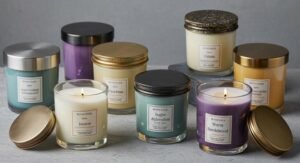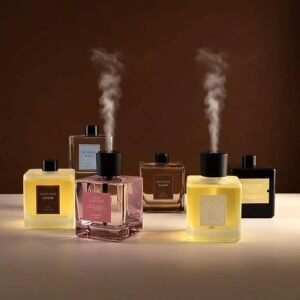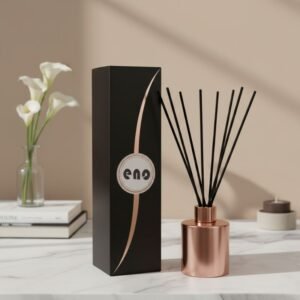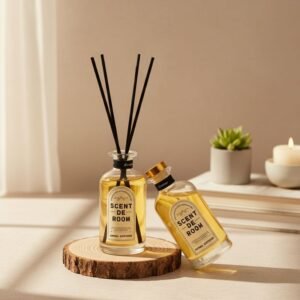Candle manufacturers face mounting pressure to source quality bulk fragrance oils while navigating complex IFRA regulations and unpredictable minimum order requirements.
Quality bulk fragrance oils for candles require IFRA compliance documentation, consistent scent throw performance, and reliable supplier partnerships. Focus on oil purity standards, competitive pricing structures, and minimum order quantities that align with your production capacity.

Through years of experience in the fragrance oil supply chain, we at Loveeno understand these industry challenges firsthand.
What Makes High-Quality Bulk Fragrance Oils Different from Budget Options?
Budget fragrance oils often compromise on purity and testing, leading to inconsistent scent performance and potential production issues.
High-quality bulk fragrance oils feature superior oil purity, higher fragrance concentration, and comprehensive quality testing protocols that ensure consistent scent throw and extended shelf stability for manufacturing applications.
Oil Purity and Fragrance Concentration Standards
Premium bulk fragrance oils maintain strict purity standards with minimal additives and diluents. Quality suppliers provide GC-MS (Gas Chromatography-Mass Spectrometry) reports verifying fragrance concentration levels and identifying any impurities that could affect performance. High-grade oils typically contain 15-30% fragrance concentration, while budget alternatives often dilute to 5-10%. This concentration difference directly impacts scent throw and longevity in finished products.
Carrier oils play a crucial role in quality differentiation. Premium suppliers use refined carrier oils like dipropylene glycol or benzyl benzoate that enhance scent stability and performance. Budget options frequently use lower-grade carriers that can cause discoloration, separation, or reduced shelf stability. Loveeno’s bulk fragrance oils undergo rigorous purity testing to ensure consistent performance across large production runs.
Quality Testing and Shelf Stability Performance
| Quality Factor | High-Quality Oils | Budget Options |
|---|---|---|
| Purity Testing | GC-MS analysis provided | Limited or no testing |
| Shelf Stability | 24+ months | 6-12 months |
| Scent Throw | Strong, consistent | Weak, variable |
| Color Stability | Minimal change | Prone to darkening |
| Flash Point | Properly tested | Often unreported |
Professional-grade fragrance oils undergo accelerated aging tests, flash point analysis, and stability assessments under various temperature conditions. These comprehensive quality testing protocols ensure reliable performance during manufacturing and extended product lifecycles. Budget oils often skip these critical testing phases, leading to batch inconsistencies and potential production failures that can cost manufacturers significantly more than the initial savings.
How Do IFRA Standards Impact Your Bulk Fragrance Oil Selection?
Non-compliant fragrance oils can force costly product recalls and regulatory headaches. Manufacturing teams face mounting pressure to source IFRA-compliant oils that meet safety regulations without compromising quality or profitability.
IFRA standards directly impact bulk fragrance oil selection by establishing maximum usage levels, requiring compliance documentation, and mandating allergen declarations from suppliers. These safety regulations determine which oils manufacturers can legally use in their candle production lines.
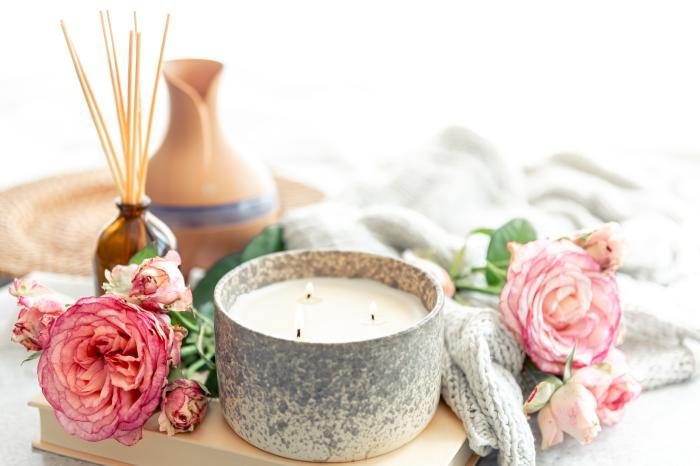
Certificate of Conformity Requirements
Every bulk fragrance oil supplier must provide a Certificate of Conformity that confirms their oils meet IFRA standards for intended applications. This document serves as your legal safety net, outlining specific usage limits for each product category. When sourcing bulk candle oils, manufacturers need these certificates to verify that their chosen fragrance concentrations fall within approved safety thresholds.
R&D teams use these certificates to calculate maximum fragrance loads per application. For instance, a fragrance oil might be safe at 8% in candles but restricted to 5% in personal care products. Loveeno provides detailed compliance documentation with every bulk order, enabling manufacturers to make informed decisions about fragrance loading ratios.
Restricted Ingredients and Allergen Management
IFRA standards identify specific restricted ingredients that require careful monitoring in bulk purchases. These include certain aldehydes, essential oil components, and synthetic compounds that pose potential health risks. Manufacturers must track these substances across their entire supply chain to maintain compliance.
| Common Restricted Ingredients | Maximum Limits | Impact on Sourcing |
|---|---|---|
| Benzyl salicylate | 0.1-1.0% | Requires careful blending |
| Coumarin | 0.1-0.8% | Limited in gourmand scents |
| Citronellol | No specific limit | Allergen declaration required |
| Linalool | No specific limit | Must appear on product labels |
Safety regulations also mandate allergen declarations when certain compounds exceed specified thresholds. This affects packaging requirements and shipping logistics, as bulk suppliers must provide detailed ingredient breakdowns for each fragrance oil batch. Proper documentation ensures smooth customs clearance and regulatory compliance across different markets.
Are Sample Orders Essential Before Committing to Bulk Purchases?
Manufacturing teams face costly errors when bulk candle oils fail performance standards after large investments, threatening production timelines and profit margins.
Sample orders serve as critical quality gatekeepers, enabling manufacturers to validate fragrance performance, dilution rates, and wax compatibility before committing to substantial bulk purchases that could impact entire production runs.
Performance Validation Through Small-Scale Testing
Fragrance testing through sample orders prevents expensive mistakes in bulk production. Cold throw and hot throw characteristics vary significantly between suppliers, even for similar scent profiles. Manufacturers must evaluate how each oil performs at different dilution rates, typically testing between 6-8% concentrations for optimal hot throw performance.
Wax compatibility testing reveals potential issues before large-scale production. Some oils may cause poor binding at 185°F, leading to weak scent distribution or candle defects. Sample testing allows R&D teams to identify these compatibility issues early, saving thousands in wasted materials and production delays.
Strategic Sample Logistics and Decision Framework
| Testing Parameter | Sample Size Required | Evaluation Timeline |
|---|---|---|
| Cold/Hot Throw | 50ml per fragrance | 2-3 weeks |
| Wax Compatibility | 100ml per wax type | 1-2 weeks |
| Dilution Optimization | 25ml per concentration | 1 week |
| Burn Performance | 200ml total | 4-6 weeks |
Leading suppliers like Loveeno provide comprehensive sample programs that mirror their bulk oil specifications, ensuring consistency between testing and production phases. This approach reduces the risk of quality fluctuations that commonly occur when manufacturers skip sample validation steps, ultimately protecting both production schedules and customer satisfaction rates.
How Should You Evaluate Bulk Fragrance Oil Suppliers for Long-Term Partnerships?
Finding reliable fragrance oil suppliers becomes critical when production volumes scale. Poor supplier choices lead to inconsistent product quality and disrupted manufacturing schedules.
Evaluate suppliers based on quality consistency, technical support capabilities, custom formulation flexibility, and order adaptability. Prioritize partners offering transparent communication, competitive pricing structures, and proven track records in bulk candle oil delivery.
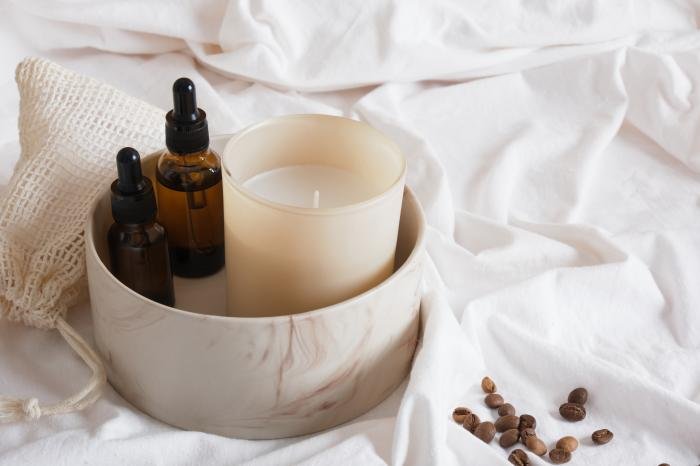
Quality Assurance and Consistency Metrics
Consistency of supply forms the foundation of successful manufacturing partnerships. Evaluate potential bulk fragrance oil suppliers for candle makers through documented quality control processes and batch-to-batch consistency records. Request certificates of analysis, safety data sheets, and performance testing results for each fragrance oil batch.
Technical support separates exceptional suppliers from average ones. Your ideal partner should provide formulation guidance, troubleshooting assistance, and application-specific recommendations. Strong suppliers offer dedicated account managers who understand your production requirements and can address concerns promptly.
Partnership Evaluation Framework
| Evaluation Criteria | Weight | Key Indicators |
|---|---|---|
| Quality Consistency | 30% | COA documentation, batch testing results |
| Technical Support | 25% | Response time, expertise level, training offered |
| Order Flexibility | 20% | Minimum order quantities, delivery schedules |
| Custom Formulation | 15% | R&D capabilities, exclusive scent development |
| Pricing Structure | 10% | Volume discounts, long-term contract benefits |
Custom formulation capabilities enable product differentiation in competitive markets. Suppliers offering exclusive scent development and modification services provide strategic advantages for long-term partnerships. Order flexibility, including adaptable minimum quantities and delivery schedules, ensures smooth production flow during seasonal demand fluctuations.
Companies like Loveeno demonstrate these partnership qualities through consistent oil quality, responsive technical support, and flexible ordering systems designed for manufacturing operations. Their approach to bulk candle oil sourcing emphasizes both immediate needs and long-term strategic growth.
Conclusion
Successfully sourcing quality bulk fragrance oils for candles requires balancing IFRA compliance, supplier reliability, and performance standards. Prioritize suppliers offering comprehensive documentation, consistent quality testing, and flexible partnership terms. Sample testing remains essential for validating performance before bulk commitments, while long-term supplier relationships ensure sustainable production growth. Focus on partners who provide technical support, custom formulation capabilities, and transparent pricing structures to build a resilient fragrance oil sourcing strategy that supports your candle manufacturing objectives.
FAQ
Q1: What is the typical shelf life of bulk fragrance oils for candles?
The typical shelf life of bulk fragrance oils for candles ranges from 1-2 years when stored properly in cool, dark conditions away from direct sunlight and extreme temperatures. High-quality fragrance oils with proper formulation and IFRA compliance tend to maintain their scent integrity longer. Manufacturers should always check the manufacturer’s recommended shelf life and store oils in sealed containers to prevent oxidation and evaporation.
Q2: How do IFRA standards affect bulk fragrance oil sourcing for candle manufacturing?
IFRA (International Fragrance Association) standards are crucial for bulk fragrance oil sourcing as they ensure product safety and regulatory compliance. These standards dictate the maximum allowable usage levels of fragrance ingredients, particularly for products like candles that involve combustion. Manufacturers sourcing bulk oils must verify IFRA compliance certificates to ensure their products meet international safety guidelines and avoid potential liability issues.
Q3: What are the recommended dilution rates when using carrier oils with fragrance oils for candles?
Recommended dilution rates for fragrance oils in candle making typically range from 6-10% of the total wax weight, depending on the specific fragrance oil strength and wax type. Some highly concentrated oils may require lower percentages (4-6%), while lighter scents might need up to 12%. Always follow the manufacturer’s specific recommendations and conduct sample testing to determine optimal scent throw and performance in your particular candle formulation.
Q4: How can manufacturers test oil purity when sourcing bulk fragrance oils for candle production?
Manufacturers can test oil purity through several methods: requesting Certificates of Analysis (COA) from suppliers, conducting gas chromatography-mass spectrometry (GC-MS) testing for chemical composition verification, performing stability testing under various conditions, and checking for consistent viscosity and color. Reputable suppliers should provide documentation of purity testing, including absence of fillers, diluents, or contaminants that could affect candle performance and safety.
Q5: What packaging and shipping considerations are important for bulk fragrance oil orders?
Bulk fragrance oil shipping requires specialized packaging including HDPE or glass containers with secure caps, secondary containment to prevent leaks, proper labeling for hazardous materials classification, and temperature-controlled shipping when necessary. Manufacturers should consider sample orders first to test quality, then plan for bulk shipments using appropriate DOT-compliant packaging for liquid hazardous materials. Many suppliers offer various container sizes from gallons to drums with customized shipping solutions.

